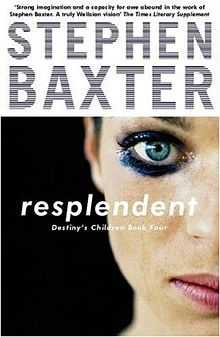Resplendent

Resplendent is an English language science fiction collection published in 2006. It is the fourth and final book in Stephen Baxter's Destiny's Children series.
This book is a collection of short stories relating to the previous three books, comprising new works and previously published stories, including the novellas Reality Dust and Riding the Rock and Mayflower II, an 88-page novella taking place in the Xeelee Sequence that won the 2004 BSFA Award for the Best Short Fiction; it was published in 2004.
It contains the following stories:
- “Cadre Siblings”, Interzone 153, 2000–03.
- Reality Dust, 2000.
The sixth work in the Xeelee Sequence. The plot begins not very long after the Third Expansion began (the First Expansion ended when humanity was conquered by the Squeem; the Second Expansion ended with the conquest of humanity by the Qax, and the Third Expansion, ~5400 CE, began after the events of Timelike Infinity, pursuant to Jim Bolder's destruction of the Qax home-system). The protagonist, one "Hama", an investigator for Earth's Truth Commission, is investigating the surviving Qax-collaborators (as the Qax restricted access to AS- anti-senescence technology – to collaborators, they are rather old, and are known as "Pharaohs"); he follows one renegade Pharaoh to Callisto.
- “Silver Ghost”, Asimov’s, 2000–09.
- “On the Orion Line”, Asimov’s, 2000–10.
- “In the Un-Black”, Redshift, 2001.
- “The Ghost Pit”, Asimov’s, 2001–07.
- “The Cold Sink”, Asimov’s, 2001–08.
- “Breeding Ground”, Asimov’s, 2003-02.
- “The Great Game”, Asimov’s, 2003-03.
- “The Chop Line”, Asimov’s, 2003–12.
- “The Dreaming Mould”, Interzone 179, 2002–05.
- “Conurbation 2473”, Live without a Net, 2003–08.
- “All in a Blaze”, Stars: Stories Based on the Songs of Janis Ian, 2003.
- Riding the Rock, 2002–11.
The seventh work in the Xeelee Sequence. The plot is set in the Third Expansion era, in which humanity has thrown off the successive yokes of the Squeem and the Qax, and has been so successful that it is second only to the Xeelee among baryonic races. However, humanity's jealousy has driven it to futilely and brutally dedicate their culture (sending soldiers off as young as 13) to warring for over 18,000 years upon the Xeelee. The characters engage in quasi-trench warfare against the Xeelee in the galactic core.
- “Lakes of Light”, Constellations, 2005.
- “Between Worlds”, Between Worlds, September 2004.
- Mayflower II, 2004–08.
The eight work in the Xeelee Sequence. The plot of Mayflower II is about five generation ships leaving a doomed plant. As thousands of years pass, the humans forget that they are on a spaceship and begin running its mechanisms only through religious ritual. After 25,000 years, the humans on the ship have split in their evolution with half becoming short-lived childlike tribal people and half becoming cannibalistic animals. The ending speaks to the fact that although this situation seems gruesome and terrible that life and evolution find a way and that humans found a way to continue on living even if it meant giving up what is traditionally thought of as human.
The story begins on Pluto in the distant future. Its inhabitants, former collaborators of the Qax, humanity's erstwhile conquerors, are under attack from the new-formed Coalition, seeking revenge for humanity's enslavement. As such, the inhabitants send five generation ships out of the solar system in the hopes that they will be able to form colonies of their own that can survive the Coalition. Rusel, the protagonist, is admitted onto Mayflower II, one of the ships, at the last minute. Shortly after takeoff, it is revealed that the ship's intended destination is outside the galaxy, requiring a flight time of 50,000 subjective years, even with the effects of time dilation.
The ship's captain selects a few individuals to receive medical treatment granting them immortality, allowing them to guide the ship through its millennia-long voyage. Over time, however, these individuals die through malfunctions or boredom, leaving Rusel as the only immortal on board, but he becomes increasingly dependent on life-support and gradually merges with the ship.
Over time, the other inhabitants of the ship form several different societies, gradually becoming detached from their original humanity. Eventually, they form an almost unrecognisable tribal civilisation. Having forgotten that they are on a spaceship at all, they only maintain it through religious tradition.
After 25,000 years have passed, the Mayflower is contacted by Pirius and Torec (protagonists of Exultant), former soldiers of the Coalition, which is revealed to have fallen. They offer to remove the inhabitants from the ship and care for them elsewhere. Rusel, now completely merged with the ship's systems, allows them to do so. Pirius and Torec then leave Rusel to continue into space without the burden of the crew, which he gladly accepts.
- “Ghost Wars”, Asimov’s, 2006-01.
References
| |||||||||||||||||||||||||||||||||||||||||
| ||||||||||||||